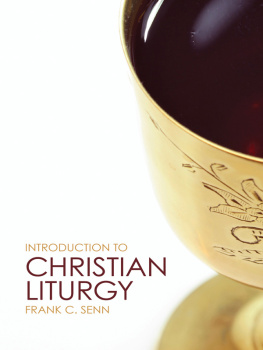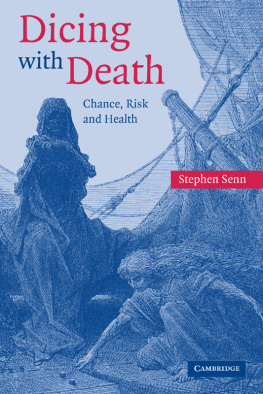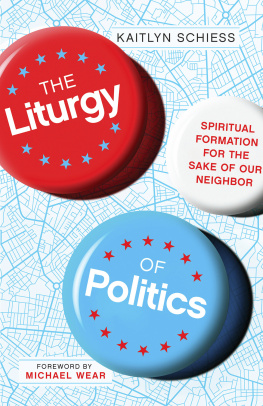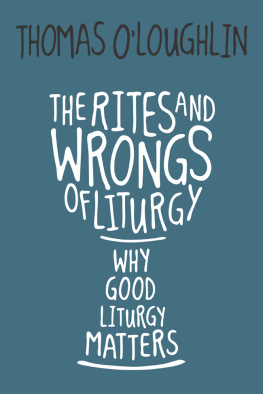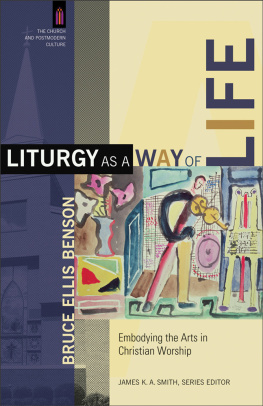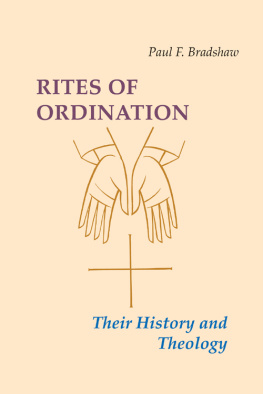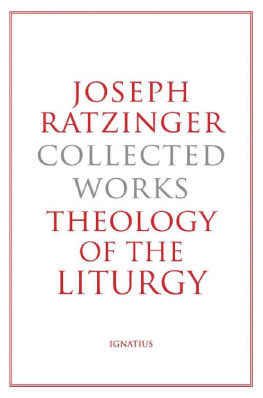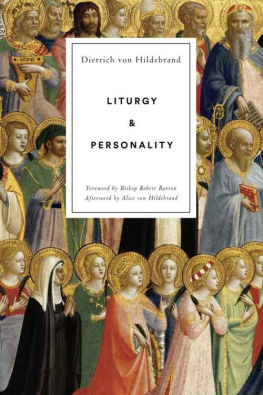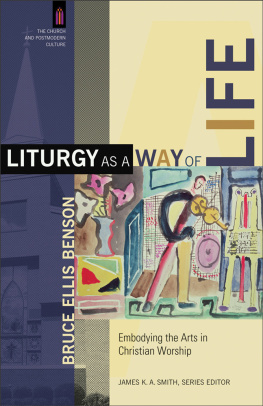Senn - Introduction to Christian Liturgy
Here you can read online Senn - Introduction to Christian Liturgy full text of the book (entire story) in english for free. Download pdf and epub, get meaning, cover and reviews about this ebook. City: Minneapolis, year: 2012, publisher: Fortress Press (NBN), genre: Religion. Description of the work, (preface) as well as reviews are available. Best literature library LitArk.com created for fans of good reading and offers a wide selection of genres:
Romance novel
Science fiction
Adventure
Detective
Science
History
Home and family
Prose
Art
Politics
Computer
Non-fiction
Religion
Business
Children
Humor
Choose a favorite category and find really read worthwhile books. Enjoy immersion in the world of imagination, feel the emotions of the characters or learn something new for yourself, make an fascinating discovery.
Introduction to Christian Liturgy: summary, description and annotation
We offer to read an annotation, description, summary or preface (depends on what the author of the book "Introduction to Christian Liturgy" wrote himself). If you haven't found the necessary information about the book — write in the comments, we will try to find it.
Senn: author's other books
Who wrote Introduction to Christian Liturgy? Find out the surname, the name of the author of the book and a list of all author's works by series.
Introduction to Christian Liturgy — read online for free the complete book (whole text) full work
Below is the text of the book, divided by pages. System saving the place of the last page read, allows you to conveniently read the book "Introduction to Christian Liturgy" online for free, without having to search again every time where you left off. Put a bookmark, and you can go to the page where you finished reading at any time.
Font size:
Interval:
Bookmark:
INTRODUCTION TO
CHRISTIAN
LITURGY
INTRODUCTION TO
CHRISTIAN
LITURGY
FRANK C. SENN
Fortress Press
Minneapolis
INTRODUCTION TO CHRISTIAN LITURGY
9781451424331
Copyright Fortress Press 2012. All rights reserved. Except for brief quota-tions in critical articles or reviews, no part of this book may be reproduced in any manner without prior written permission from the publisher. Visit www.augsburgfortress.org/copyrights/contact.asp or write to Permissions, Augsburg Fortress, Box 1209, Minneapolis, MN 55440.
New Revised Standard Version (NRSV) translation, copyright 1989 by the Division of Christian Education of the National Council of the Churches of Christ in the USA. Used by permission. All rights reserved.
This book is also available in print at www.fortresspress.com
9780800698850
In memory and honor of colleagues
who showed me how to preside in liturgy
in ways strong, loving, and wise.
Eugene L. Brand
Carl Dehne, s.j .
C. Marcus Engdahl
Robert W. Hovda
Gordon W. Lathrop
Don E. Saliers
Ralph R. Van Loon


T his introduction to Christian liturgy is a pastoral liturgical handbook. I will define liturgy in the first chapter. But what does it mean to be pastoral? One dictionary defines pastoral as an adjective referring to the lifestyle of shepherds and other pastoralists such as cowboys as they move livestock around large areas of land according to seasons and availability of water and food. Since Christian leaders have been called pastors (shepherds), there is something in this definition that can help us understand what it means to be pastoral, especially in the liturgy.
Pastoral leaders (lay as well as ordained) have the responsibility of moving the assembly to the sources of nourishmentword and sacramentand provide the kind of exercisepraise and prayerthat keeps the flock spiritually healthy. Providing what the flock truly needs sometimes involves moving it in directions in which it doesnt want to go, as real shepherds know from experience. The people need to hear sermons that challenge their assumptions as well as comfort them (in the biblical sense of strengthening). Pastoral leaders have sometimes striven to increase the frequency with which the people receive Holy Communion, which also means that for Protestants the sacrament needs to be celebrated more frequently. While this has sometimes been a source of contention, the ordained minister of the word and the sacraments is under orders to preach the word and administer the sacraments.
Pastoral liturgy is the study and application of liturgy in the actual life of the church. It explores the nature of worship as constitutive and expressive of the Christian faith and applies these insights and commitments in concrete worshiping communities. Pastoral liturgy grounds practice in the history of liturgy and the theology of worship while being sensitive to the needs and resources of the local community of faith. These needs may be related to the cultural background of the assembly. Resources may refer to the gifts of time, talent, and treasure that the assembly has at its disposal, which may be extensive or limited. Quite frankly, too many small parishes want to do the kind of liturgy that can only be performed in a cathedral church. It is a matter of pastoral leadership to discern what the local assembly is capable of doing with the personnel and finances it has and guide the assembly to doing its public work well.
Providing this guidance also requires pastoral leaders to be knowledgeable of the liturgical tradition. This introduction attempts to organize the knowledge of the tradition that pastoral leaders should have. But it is only an introduction. Worship leaders have to dig deeper. To that end I have appended to each chapter suggestions for further reading.
The field of liturgical studies is becoming more diverse as time passes, as can be seen in the array of seminar groups in the North American Academy of Liturgy. I will try to make this introduction as ecumenically broad as possible while also providing information on specific liturgical uses. The specifics assume that an ecumenical practice has developed, especially in the liturgical churches of the West, which is manifested in the orders and rubrics of various denominational worship books and liturgical manuals. I hope that this introduction will serve an ecumenical purpose, especially in those traditions based on the historic Western rite.
While I have been formed in this ecumenical liturgical tradition, I am aware that another ecumenical worship tradition has developed in Western Christianity that the late Methodist liturgist James White called frontier worship. That tradition provides an order which is used in the evangelical revival tradition, in many African American churches, in seeker services, praise and worship services, and to some extent in Pentecostal worship. I will refer to it, but I admit up front that my experience of this tradition is limited.
Because I intend this handbook to be a practical manual, I have organized the information in this book under questions that any ordained pastor or layperson might ask. The questions are the subheadings of the chapters and are listed in the table of contents. The index will indicate where to find information on more discreet topics. I have also appended a chronology of events and documents in the history of Christian liturgy and a glossary of liturgical terms.
For further reading: Other introductions to Christian liturgy
Hatchett, Marion J. Sanctifying Life, Time, and Space: An Introduction to Liturgical Study . New York: Seabury, 1976.
Jones, Cheslyn, Geoffrey Wainwright, and Edward Yarnold, S.J. The Study of Liturgy , rev. ed. New York: Oxford University Press, 1992 (1978).
White, James F. Introduction to Christian Worship , rev. ed. Nashville: Abingdon, 1990 (1980).

1. Why do we worship?
2. What is liturgy?
3. What does it mean to do liturgy decently and in order?
4. How do we discern meaning in liturgy?
5. How is the peoples work the work of God?
1. Why do we worship?
We worship God because God our Creator desires his creatures to worship him. In Exodus 3 the voice from the burning bush commissions Moses to return to Egypt and bring the people of Israel out of Egypt so that they may serve (i.e., worship) God on his holy mountain rather than serve Pharaoh (3:12). In John 4 Jesus tells the Samaritan woman at the well that the true worship of the true God will take place neither on Mt. Gerizim in Samaria nor in Jerusalem but in spirit and in truth, for the Father seeks such as these to worship him (4:23). In Revelation 45 the human creatures join the heavenly creatures in the eternal worship of God and the Lamb. The whole point of redemption is to glorify God. This eschatological goal of the human vocation is expressed in the opening question and answer of the Westminster Shorter Catechism (164748):
What is the chief end of man?
Mans chief end is to glorify God, and to enjoy him forever.
In Exodus 3:12 Israels collective worship of their God is even the sign that it is Yahweh who sent Moses to deliver the people from slavery in Egypt. This seems like a strange sign since it is fulfilled only after the fact of Israels deliverance. But we must understand that the reality of the gods in the world depends on having actual worshipers. Zeus is not a reality in our world today because Zeus has no worshipers. So, too, the God of Israel required worshipers to proclaim his reality in the world by glorifying him.
Font size:
Interval:
Bookmark:
Similar books «Introduction to Christian Liturgy»
Look at similar books to Introduction to Christian Liturgy. We have selected literature similar in name and meaning in the hope of providing readers with more options to find new, interesting, not yet read works.
Discussion, reviews of the book Introduction to Christian Liturgy and just readers' own opinions. Leave your comments, write what you think about the work, its meaning or the main characters. Specify what exactly you liked and what you didn't like, and why you think so.

